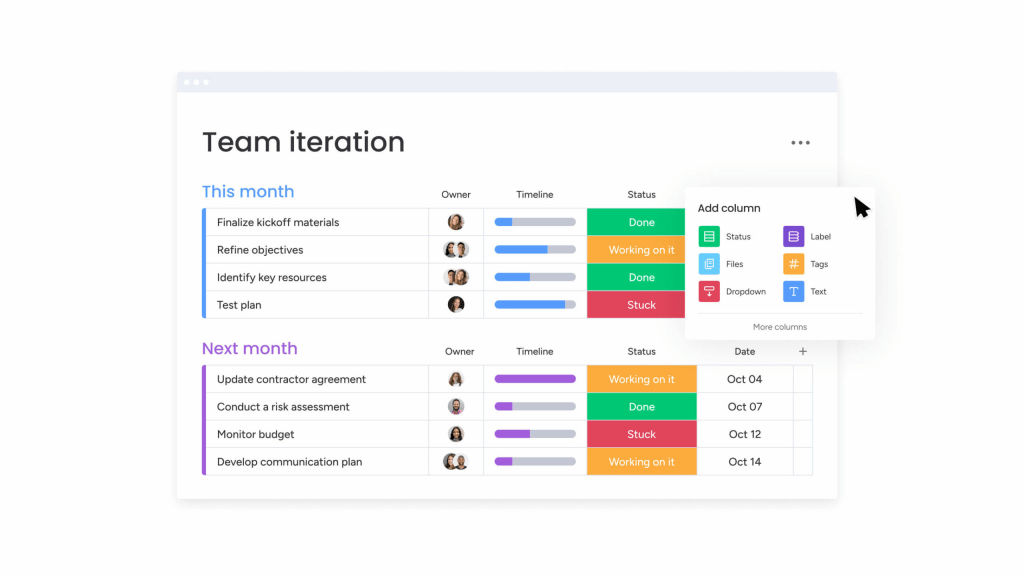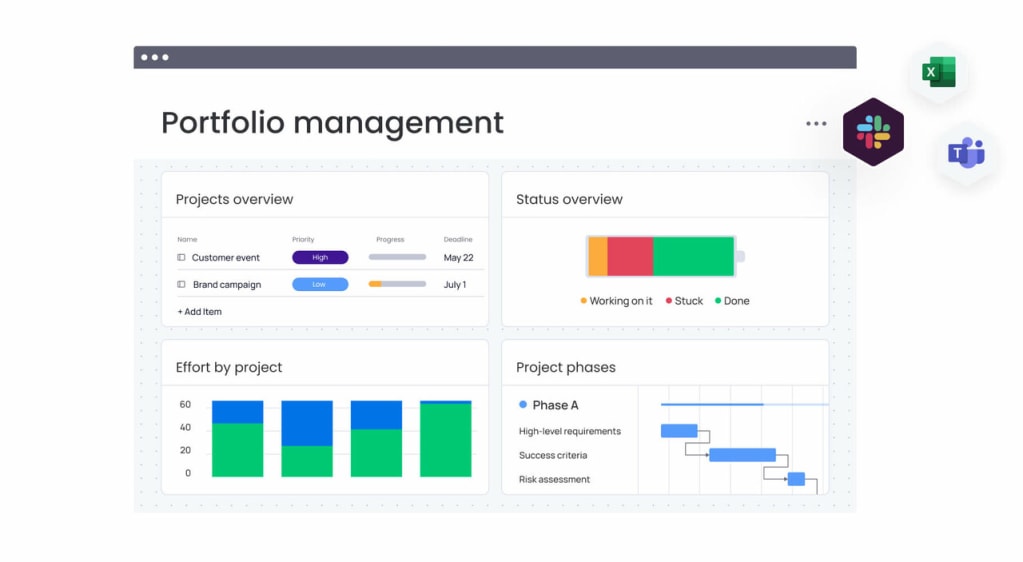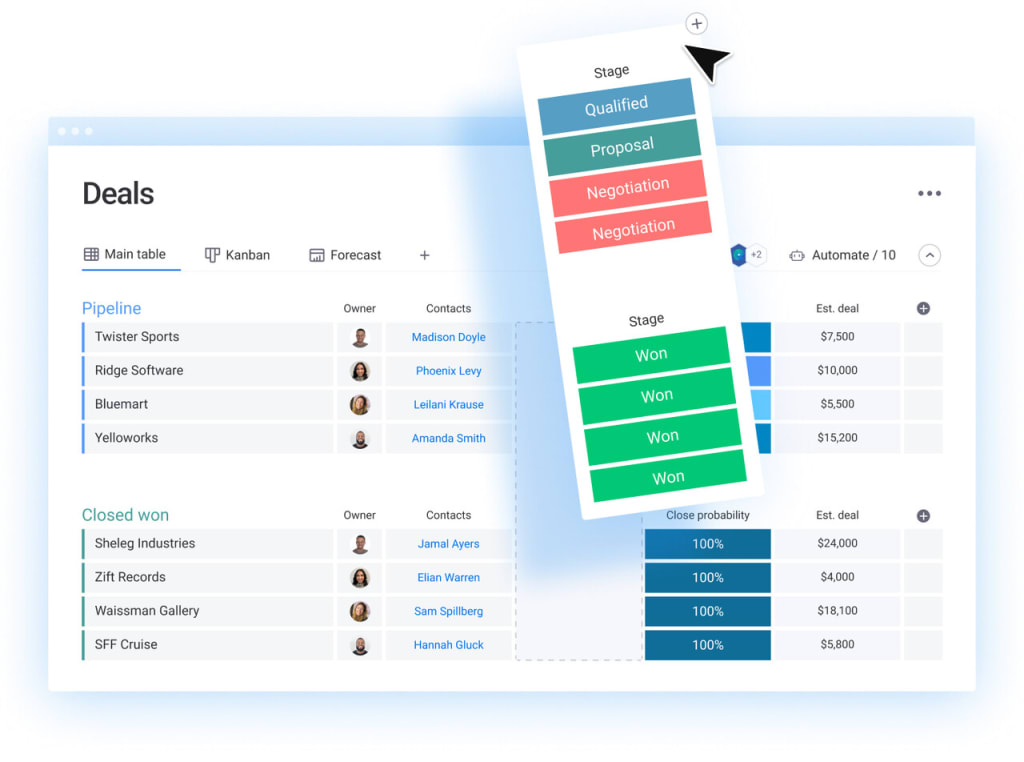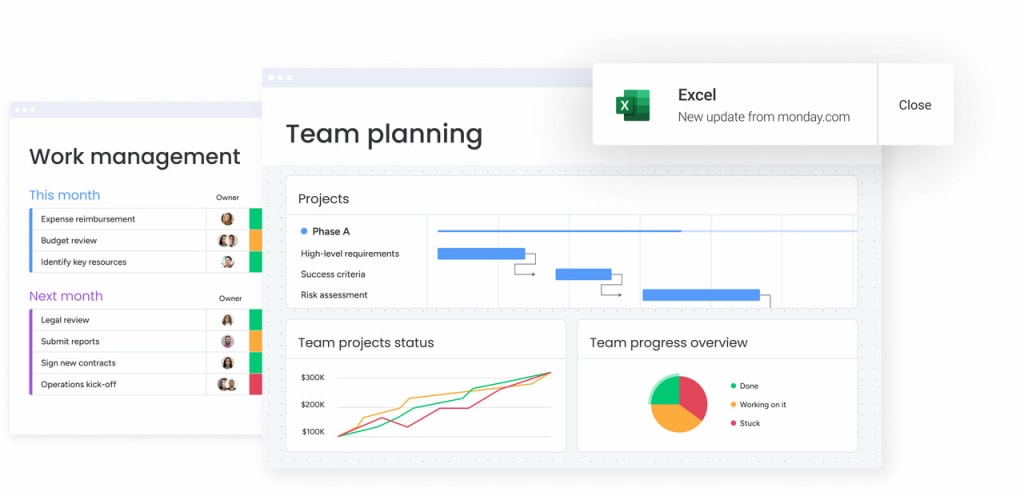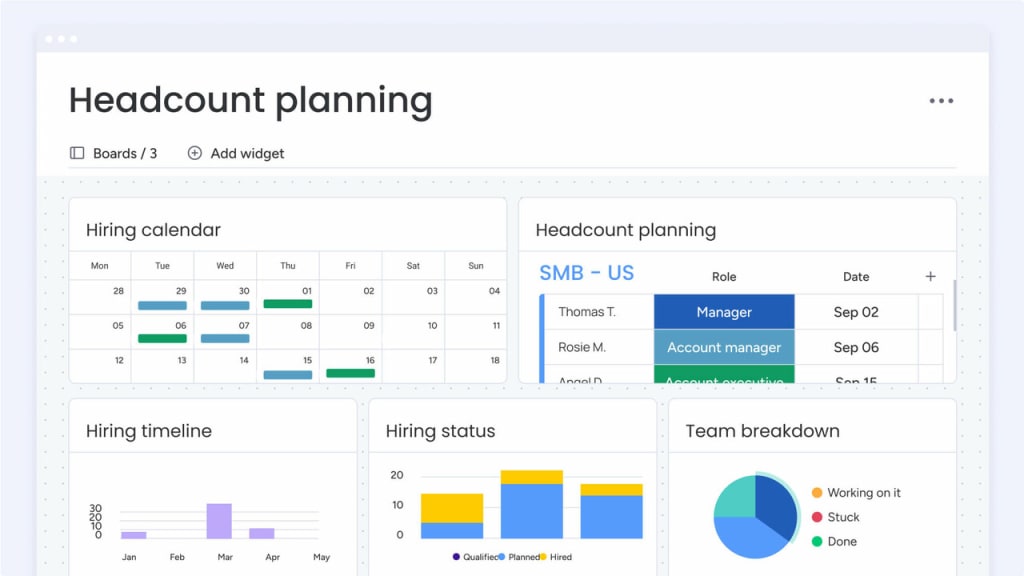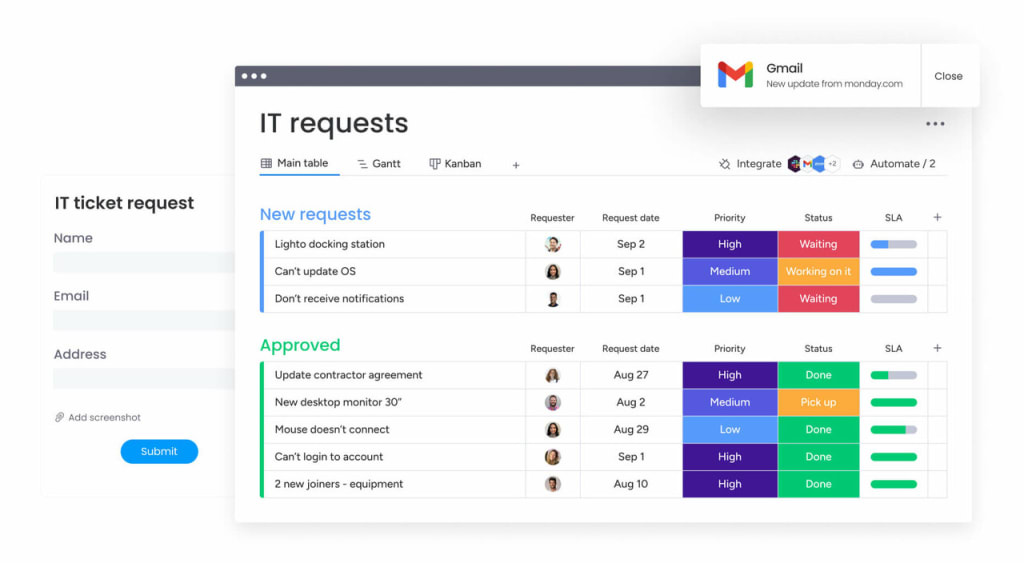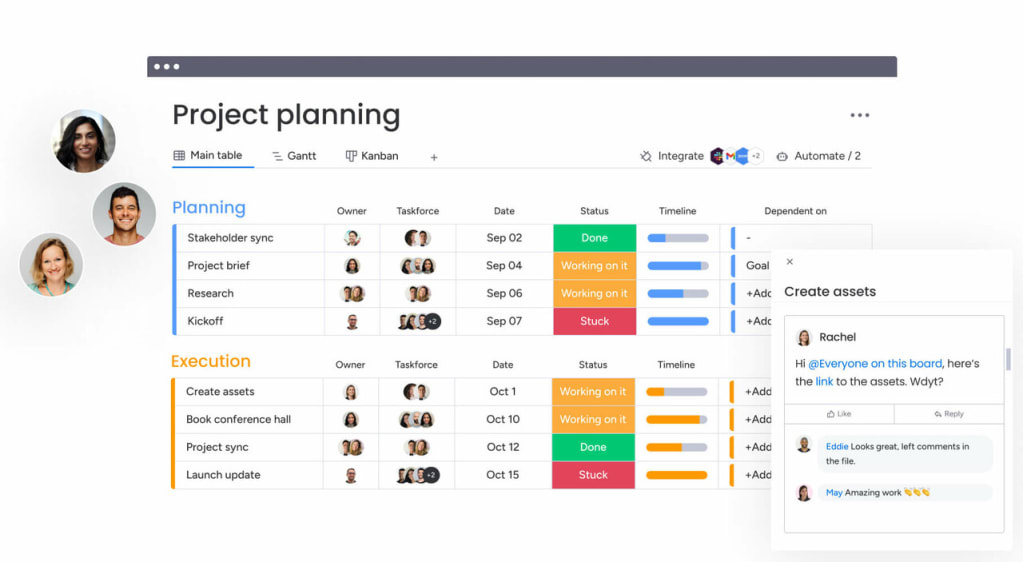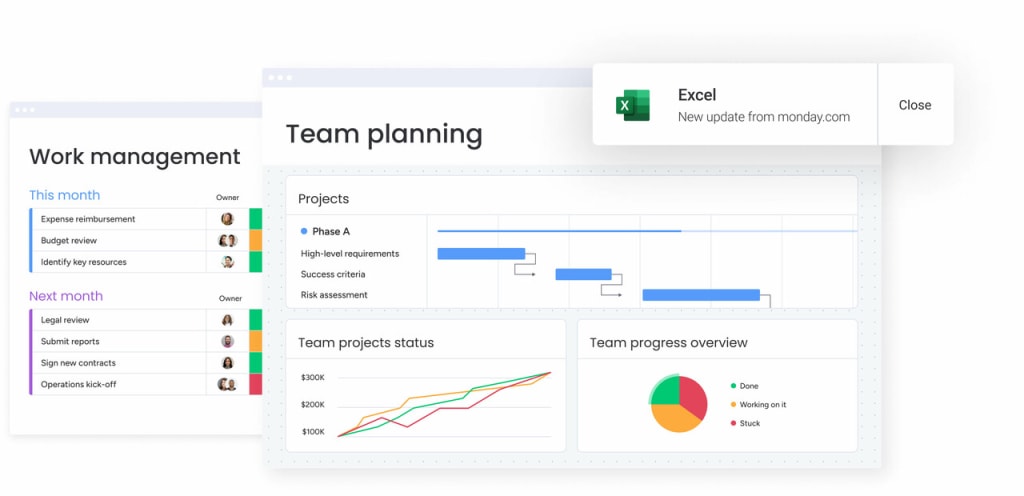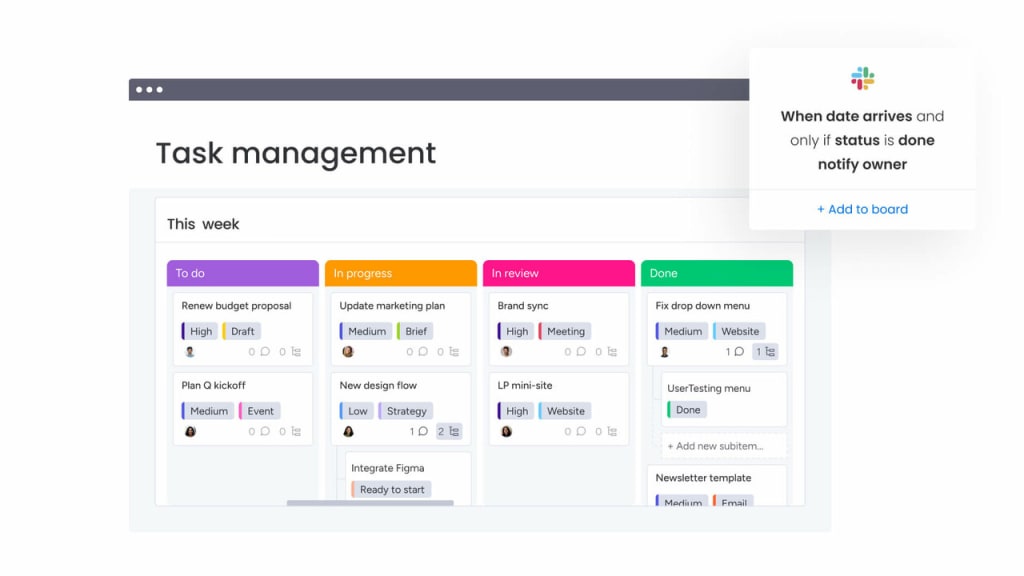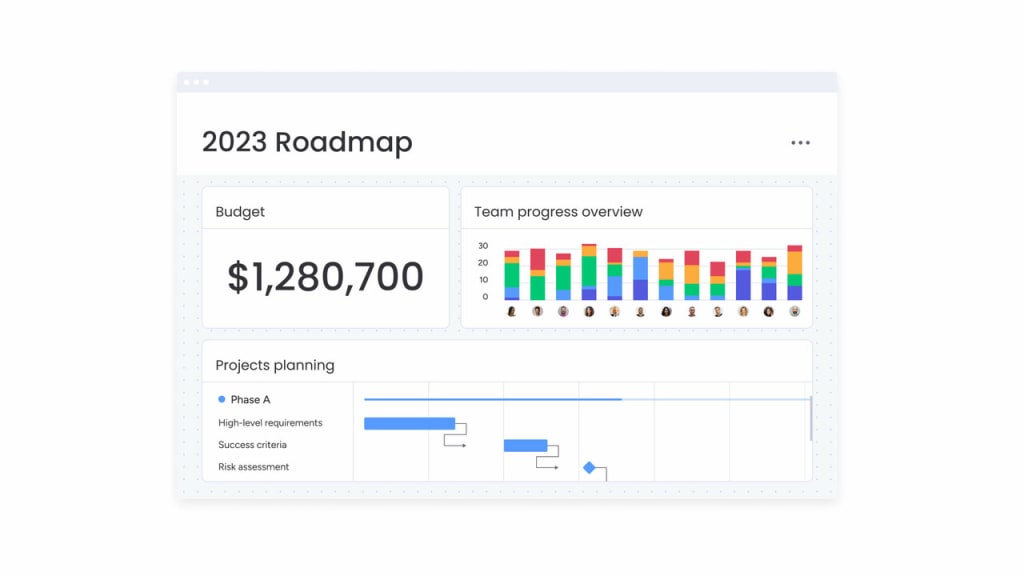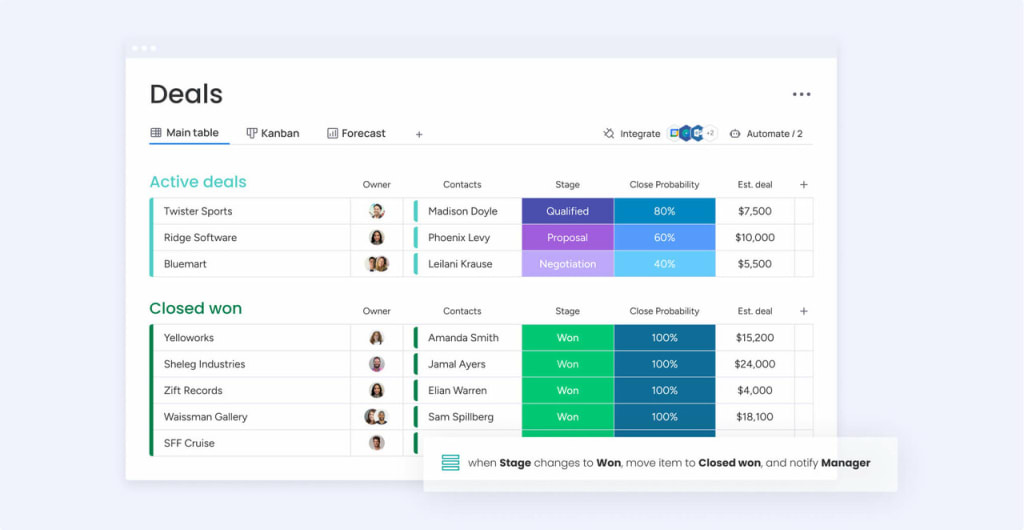The profitability of your business isn’t about your products or services. It’s about your business processes. The right processes can help you produce products faster, offer more competitive services, and attract new customers more effectively than your competitors. In this article, we’ll show you everything you need to know about streamlining your organization’s processes to boost your efficiency, using a new approach to work management.
We’ll then introduce monday work management and show you how you can use it to streamline crucial business processes.
Get startedWhat is a business process?
A business process is the sum of the activities needed to achieve a particular business outcome, as well as the logical progression these activities must follow.
Your business processes are the operating system that your business runs on. The more efficient your processes are, the more profitable your organization will be.For example, let’s imagine that you run a software company. Some of your processes might be:
- New feature development
- QA testing
- Incorporating customer feedback
- New version deployment
- Project planning
Now, each of these processes can be broken down into a series of systematic steps. For example, the process “QA testing” could involve:
- Planning test coverage
- Conducting exploratory manual testing
- Addressing bugs and re-running tests
By dissecting each process with surgical precision, you can identify where the bottlenecks and revenue leaks are, so you can fix them. That’s how you make a business process more efficient. For instance, you could improve the “QA testing” process by buying a software that lets you automate some of the testing.
Having a clear understanding of business process management is the first and perhaps most important step toward improving your business.
What are the different types of business processes?
Even though some organizations may have more complex processes than others, all business processes can be grouped into 3 categories:
- Operational (primary): all the processes that are directly related to income generation
- Supporting (secondary): processes that help you keep things organized
- Managerial: processes that help you manage all the other processes
Understanding the role of each category is crucial for the operation of your business.
For example, no matter how well-structured your managerial processes are, if the operational side of your business isn’t working, you’ll struggle to turn a profit.
On the other hand, if your core processes are working fine, but you don’t have a management strategy in place to ensure those processes continue working over the long run, you’ll be risking your entire business.
Want to learn more about business process management? Check out our free Process Management Handbook.
What is the importance of business processes?
According to data from the Bureau of Labor Statistics, only 50% of businesses will survive their 5th year, and only 30% will see their 10th.
One of the main reasons is a lack of product/market fit.
For example, some businesses provide value to an audience in the early stages, but as markets evolve, their products and services grow obsolete.
Another important reason is that most businesses don’t know how to control the chaos. As organizations grow, so do challenges and complexity. Without well-structured processes in place, no organization can survive for very long. In other words, business processes are one of the two key factors that will keep the lights on in your company over time.
The collection of the right strategic processes will build a functional system that’ll keep your business together, especially today.What are the characteristics of an ideal business process?
How do you know if your business processes are up to scratch? For each process, ask yourself:
Is it finite?
If you’ve defined a business process correctly, it will have a beginning, a middle and an end. There should be a specific number of steps to complete and a clear outcome at the end.
Is it repeatable?
Effective business processes can be repeated again and again. They also aren’t dependent on a single individual. In the event of an employee falling ill, having a clearly established business process enables another staff member to seamlessly assume responsibility for the tasks.
Does it create value?
There’s no point in defining a business process that doesn’t generate real business value. Focus on creating business processes that either directly impact your revenue, or support key business functions.
Is it extensible?
Your business will change and evolve, and your processes should too. A well-defined business process will be easy to adjust and expand over time. Business process improvement is crucial to keep your business running smoothly as you grow.
What are the benefits of using software for business processes?
Software can make it far easier to keep your business processes streamlined and efficient. Some of the benefits of introducing a business process management software into your business include:
- Making your processes faster by using automations, such as notifying the right team member automatically when a task is ready for them
- Creating standardized, repeatable workflows and templates to reduce human error
- Centralizing all your work into a single platform so you have everything you need to complete your business processes
- Keeping track of all your processes, checking in on progress and updating your team easily
Try out monday work management today and see how much easier your business processes can be.
Get startedWhat are the core business processes?
Each business function has a unique set of processes that support the overall success of your business – the core business processes that drive your company. Here are a few business process examples:
1. Marketing processes
Marketing is the discipline of attracting the right people and helping them see that your product or service is the right solution for their problems, needs, or desires.
Some of the most crucial marketing processes include:
- Lead capturing: saving leads’ information for future opportunities
- Lead nurturing: educating prospects about their problems and the solution you’re offering
- Marketing automation: automating communications, personalizing your messaging, and streamlining repetitive tasks
- Market research: studying your market to find potential gaps you can fill
- Competitive analysis: studying your competitors’ strengths and weaknesses
- Campaign planning: orchestrating your marketing activities to achieve a specific goal
Marketing is crucial for any organization, and you need the right system to manage these processes.
With monday marketing work management software, you can manage even a complex marketing project portfolio. monday work management makes it easy to:
- Work collaboratively to set goals and strategy with internal and external stakeholders;
- Plan your marketing team’s work, assess team capacity, and assign tasks;
- View work processes in context with Kanban, Gantt charts and timelines;
- Stay on top of project status, avoid bottlenecks, and track marketing spend to stay on budget;
- Measure marketing impact with integrations like Supermetrics and Google Ads.
2. Sales processes
The main goal of sales is to turn marketing qualified leads (MQLs) into customers through strategic value communication and customer relationship management.
Some of the most important processes in sales include:
- CRM (Customer Relationship Management): managing every customer touchpoint to maximize results and build better relationships with customers
- Lead qualifying: identifying the prospects who are more likely to buy right now
- Pipeline management: managing your sales lifecycle and forecasting potential revenue
- Post-sales: managing the post-sales strategy to ensure a better experience
- Lead scoring: scoring leads based on specific actions and criteria (clicks, past purchases, etc.)
monday.com makes it easy for busy sales teams to manage multiple tasks and processes, so they can close deals more efficiently.
3. Software development processes
A software development team’s objective is to build products that meet stakeholders’ requirements in the least amount of time, without compromising quality.
To achieve it, software developers use some of the following processes:
- Sprint planning: breaking down the project into small time boxes and defining deliverables for each sprint
- Features and releases: prioritizing features and releases and aligning your team
- Testing: making sure a specific product or feature works before actually releasing it
- Deployment: making the product available for use
- Maintenance: monitoring and controlling the end result to make sure nothing slips through the cracks
Keep your developers on the same page with monday work management’s intuitive interface, which makes it easy to visualize project progress with color-coded boards in the layout you prefer (Kanban, Gantt, timeline – you name it.)
4. HR processes
Human resources (HR) focuses on managing the most valuable resource in an organization: the people.
To do it, HR teams follow some of these processes:
- Recruitment: attracting the right talent for specific positions
- Onboarding: helping new hires understand their role and adapt to the organization faster
- Selection: analyzing job applicants and selecting the right candidates based on predetermined criteria
- Training: training the team on specific skills and crucial activities for the business
With monday.com, managing all these business processes is pretty straightforward. Our visual boards make it easy to track complex HR concepts, such as headcount planning, hiring, and workforce management.
5. Customer service processes
Once marketing and sales have closed a deal, customer service must ensure the new customer has the best experience possible. If they need help or guidance when using the product or service, customer support must provide that through effective communication.
Some of the most important customer service processes include:
- Contact management: managing customer information — name, email, chat history, etc. — to provide better service
- Ticket requests: handling customer problems in the most efficient way possible
- Community management: optimizing every touchpoint with customers to build better relationships
- Feedback management: collating and analyzing customer feedback to improve the experience
- Analytics: analyze overall customer behavior to improve the service
6. Project management processes
Every organization manages projects.
Whether it’s a new product launch, an office revamp, or an advertising campaign, you need appropriate project management to reduce chaos and make sure everything works properly.
Some of the most important processes in project management include:
- Team management: allocating workload to team members, monitoring progress, and making sure everyone is on the same page
- Project planning: planning the activities required to achieve the project’s objective
- Task management: assigning tasks to team members and tracking completion
- Scheduling: schedule each activity to meet deadlines and make sure the project is completed on time
- Monitoring: controlling the execution stage to optimize all the initiatives involved
With monday PMO work management software, you can manage any type of project from start to finish. For instance, you can set and track company-level goals, gain immediate visibility over your project portfolio, and increase project efficiency by easily spotting risks in critical pathways.
FAQs about business processes
1. What is a business process?
A business process is the sum of the activities needed to achieve a particular business outcome, as well as the logical progression these activities should follow.
2. What is business process automation?
Business process automation is a way of using software to make your company run more efficiently, by making certain steps of a business process (or the entire process) automatic. monday work management comes with over 200 Automation recipes to help speed up the way you work.
3. What is business process management?
Business Process Management (BPM) is a systematic approach to analyzing, optimizing, and managing your business processes to improve efficiency and effectiveness. It involves the identification, documentation, modeling, automation, and continuous improvement of processes to achieve your business goals.
Step up your business processes with monday work management
monday work management makes it easier for you to:
- Set goals and okrs based on your company’s needs and priorities, then build out task lists to support your top-level objectives.
- Create and track tasks that move your projects forward
- Make decisions more quickly, with easy-to-use, real-time Dashboards that make it clear what your next move should be
- Build customized, no-code automated workflows that make your processes run more smoothly, and save your team’s time and energy
Want to see how monday work management can fuel your business process efficiency and drive real results? Try it for free today.

